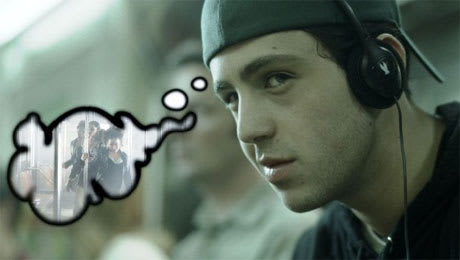The woods are full of messed-up kids who become confused filmmakers. Sadly, there are far fewer examples of such filmmakers coming to terms with their shattered youths, and The Wackness does nothing to counteract this.
Based on director Jonathan Levines youth, it depicts the relationship between angry hip-hopper Luke (Josh Peck) and his gonzo psychiatrist Dr. Squires (Ben Kingsley). As Luke pays for his sessions with high-grade pot, its not the most normal of therapeutic relationships, but Levine cant seem to give it much more shape than "crazy, man!
Though Luke is having problems with his financially insolvent parents and is besotted with the good doctors stepdaughter Stephanie (Olivia Thirlby), most of this is standard growing-up clichés, coupled with some not-at-all convincing exonerations of the bad shrinks reckless behaviour.
Stephanie is of course one of those ultra-confident bitch/goddess girlfriends of adolescent legend, and as such shes not well developed and is even less convincing. Plus, for a movie set during hip-hops early 90s cultural ascendancy, its rather light on good tunes or attention to the scene.
Details aside, its not entirely clear what Levine is trying to say with this beyond the obvious observation that growing up is hard to do. When he does stray into the weird social deformities inflicted by bad parents and worse divorces the film becomes too inarticulate to be of much use. We know that this is awkward stuff but how and why?
In the end, the director falls back on safe territory ("Weve all been there, am I right?) and reveals that while he may have grown up, he hasnt got much more perspective on what happened now than back in the day.
(Mongrel Media)Based on director Jonathan Levines youth, it depicts the relationship between angry hip-hopper Luke (Josh Peck) and his gonzo psychiatrist Dr. Squires (Ben Kingsley). As Luke pays for his sessions with high-grade pot, its not the most normal of therapeutic relationships, but Levine cant seem to give it much more shape than "crazy, man!
Though Luke is having problems with his financially insolvent parents and is besotted with the good doctors stepdaughter Stephanie (Olivia Thirlby), most of this is standard growing-up clichés, coupled with some not-at-all convincing exonerations of the bad shrinks reckless behaviour.
Stephanie is of course one of those ultra-confident bitch/goddess girlfriends of adolescent legend, and as such shes not well developed and is even less convincing. Plus, for a movie set during hip-hops early 90s cultural ascendancy, its rather light on good tunes or attention to the scene.
Details aside, its not entirely clear what Levine is trying to say with this beyond the obvious observation that growing up is hard to do. When he does stray into the weird social deformities inflicted by bad parents and worse divorces the film becomes too inarticulate to be of much use. We know that this is awkward stuff but how and why?
In the end, the director falls back on safe territory ("Weve all been there, am I right?) and reveals that while he may have grown up, he hasnt got much more perspective on what happened now than back in the day.
